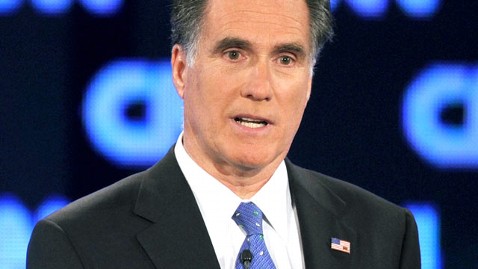The Story Behind Romney, Medicare Fraud, and the Latest SuperPAC 'Movie'

Paul Richards / AFP / Getty Images
Mitt Romney's enemies have unleashed a torrent of attacks in Florida over Medicare fraud conspiracy committed by a company Romney helped run in the 1990s.
The pro-Newt-Gingrich superPAC Winning Our Future has released a one-minute trailer and a "dramatic new film presentation" called "Blood Money," accusing Romney of personally profiting from Medicare fraud.
This follows the group's half-hour, disaster-movie-esque "King of Bain," which detailed layoffs by companies purchased by Bain Capital, the firm Romney launched.
The labor union AFSCME joined in on the attack, releasing a Florida ad tying Romney to Medicare fraud, and the Democratic National Committee today blasted an opposition-research memo to reporters leveling the same accusations. The ads may or may not resonate in Florida, where voters elected Gov. Rick Scott (R) in 2010 despite a massive Medicare-fraud penalty paid by his health-care management company.
"Those who engaged in wrongdoing were punished," a Romney aide wrote in an email today when asked about the ads. "Gov. Romney did nothing wrong."
What's the story behind Romney the sensationalized "Blood Money" accusation?
It all stems from Damon Corp., a medical-testing company run by Romney and Bain in the 1990s, which was caught in a widespread federal investigation into Medicare fraud at lab companies.
In 1989, Bain took over Damon Corp., then based in Massachusetts, and Romney sat on Damon's board from 1990 until 1993, when Bain sold the company to Corning Inc.
During Romney's tenure at Damon, the company allegedly defrauded Medicare for millions of dollars by offering packages of blood tests that resulted in doctors ordering unnecessary lab-work, paid for by Medicare. Damon offered suites of blood tests that, in some cases, were unrelated. Doctors could order Damon's lab-work in these packages-but Damon did not inform those doctors that it would bill Medicare for the superfluous tests included in the packages.
After Bain sold the company to Corning, federal investigators caught Damon and a host of other medical-lab companies engaged in similar activity. Damon pleaded guilty to Medicare fraud in 1996 and paid a total of $119 million, including a criminal fine and a civil settlement. The United States Attorneys Bulletin outlined the sweeping investigations, known as LABSCAM, in its April 1997 issue. Other companies, such as SmithKlineBeecham, were also caught engaging in fraudulent activity and were forced to pay fines.
This isn't the first time all Damon Corp. has come up in Romney's political career. When he ran for governor in 2002, his Democratic opponent pointed out the Damon fines.
Confronted over it in 2002, Romney told media he "blew the whistle" on Damon's fraudulent Medicare activity when he found out about it. And he did-to some extent.
"We put in place a program to stop that immediately," Romney told reporters on Oct. 9, 2002, according to a Boston Globe account. "That's how you blow the whistle."
Romney's present critics are quick to point out that U.S. attorneys didn't see it that way. Damon's prosecutors credited Corning, not Romney or Bain, with discovering and ferreting out the alleged fraud.
Romney and the Damon board did, however, contact Damon's lawyers, seek their counsel, and change Damon's policies.
The New York law firm Schulte, Roth & Zabel advised Damon to change its policy to clarify its requisition orders with doctors, The Boston Globe reported in 2002. Knowing of the federal investigation into lab companies, the firm told Damon that its policies weren't the same as those of National Health, another lab company accused of fraud by federal investigators, and ultimately advised Damon that its policies didn't violate any laws. Neither Damon nor Romney alerted federal investigators to this process.
Damon took the firm's advice and implemented the policy changes-but those changes weren't significant enough to save Damon from prosecution.
In 2002, Romney said he'd done his due diligence.
"We took action based on what the law firm told us," he said during a campaign appearance with president George W. Bush, the Associated Press reported at the time.
So while federal investigators, news media, and Romney's critics have been quick to note that Romney did not, in fact, stop Damon's questionable practices or effectively "put in place a program" that succeeded in stopping them, Romney did address the matter, as he said he did in 2002.
We can expect Romney's opponents to keep surfacing one key number, however: the $473,000 Romney reportedly gained from the sale of Damon Corp.
See the ad, which takes facts from the Damon case to accuse Romney of "Blood Money", below.
Responding to the ad, Romney spokeswoman Andrea Saul wrote in an email, "Newt Gingrich's SuperPAC ads would make Michael Moore proud and have already struck a chord with President Obama's liberal allies. They have been thoroughly discredited by independent fact checkers and by respected Republicans like Jeb Bush and Marco Rubio. Once again, Speaker Gingrich is reaching into President Obama's playbook and trying to re-litigate old Democratic attacks."
Though Winning Our Future is steered by former Gingrich spokesman Rick Tyler, the former House speaker and his campaign are prohibited by federal election law from coordinating with the group or advising it on ads and messaging.
Gerard Middleton contributed to this report.